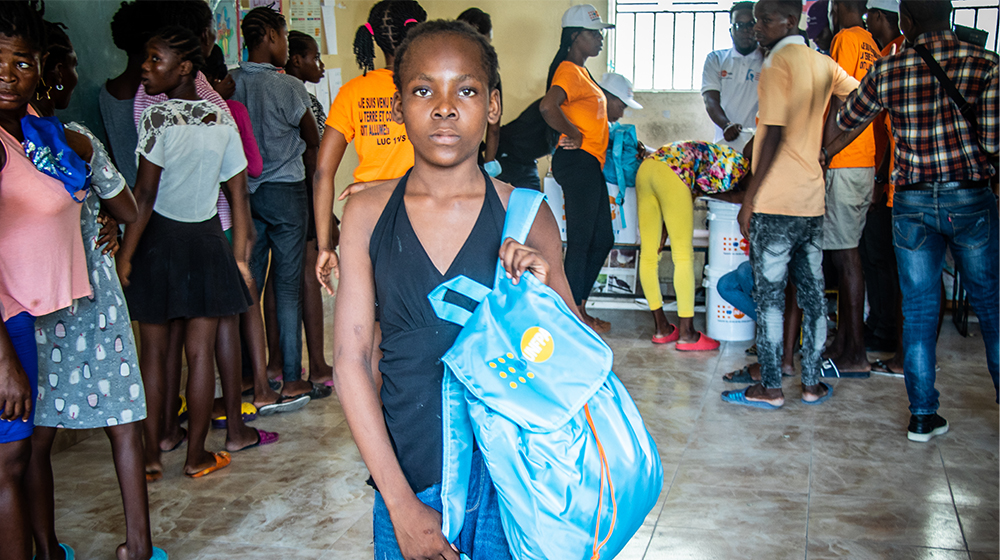Port-au-Prince, August 2, 2022---UNFPA in Haiti has distributed health kits in 4 accommodation sites for displaced people who have fled deadly violence in Cité Soleil in recent weeks.
Women of childbearing age received dignity kits on August 1, 2022, east of Port-au-Prince. Pregnant and lactating women got mom kits.
Dignity kits consist of bath and laundry soap, sanitary napkins, panties and bath towels, toothbrush, toothpaste, comb, toilet paper, T-shirt and water purification solution.
Mom kits are made up of layettes, nappies, wipes, baby creams, eau de cologne, soap, comb, clothes, blankets.
The contents of both types of kits will last for 3 months.
One of the beneficiaries explained that she lost everything during the displacements. She is pregnant and relies only on help to survive. Her husband was shot dead in Cité Soleil.
According to UNFPA's National Sexual and Reproductive Health Coordinator in Haiti, Dina Saintilmon, this distribution is a first response to certain sexual and reproductive health needs of vulnerable women and girls, mostly between the ages of 8 and 18.
These kits take into account the vulnerable situation of these people who could not bring anything with them during their displacement, she said.
"The needs for support and supplies of sexual and reproductive health materials are great and call for urgency," she said. “This is why the contents of the kits have been calculated with precision,” she noted.

These immediate actions provide a response, but are not sufficient. UNFPA will continue its activities by organizing mobile clinics in the neighborhoods of Cité Soleil together with health facilities and hospitals.
According to the National Sexual and Reproductive Health Coordinator, UNFPA will continue to support health facilities and hospitals in sexual and reproductive health.
A hospital center in Cité Soleil, which UNFPA has a collaboration with and which continues to operate, will receive materials for the maternity ward and the operating room. She expresses the hope that the actions of UNFPA can be used to relieve this part of the population victim of this violence. This support aims to prevent preventable maternal deaths.
The United Nations Integrated Office in Haiti (BINUH) published on August 1 a report on the wave of deadly violence that broke out between April 24 and May 16, in the north and west of the metropolitan region of Port- au-Prince, involving two coalitions of gangs fighting to take control of specific areas of the commune of Cité Soleil, Croix-des-Bouquets and Tabarre. The BINUH investigation established that in less than three weeks, at least 94 residents were killed, more than 120 were injured by gunshots and 12 others disappeared. To these figures must be added at least 96 dead and injured people among the armed gangs. Dozens of cases of sexual violence have also been reported. In addition, nearly 16,000 people have been forced to flee their homes to take refuge in makeshift sites or with relatives.
Armed with assault rifles, but also machetes and cans of gasoline, the gangs spared no one. Women and children as young as one year old were executed in their homes and their bodies were calcined. Young teenagers, accused of spying for the opposing camp, were executed in public places. The rape of women and girls, some under the age of 10, has been used as a weapon to terrorize and revenge on local populations living in neighborhoods controlled by rival gangs.
The reception sites have been identified by UNFPA following an assessment of the situation of victims of the wave of clashes between coalitions of gangs carrying out a form of deadly violence that spares no one.
These spaces are schools located in the areas of Delmas 31 and 33. They welcome children and teenagers on behalf of a congregation called Family Kizito.
This religious community, reports its spokesperson, works in Cité Soleil to provide access to education, cultural and leisure activities for children and adolescents, and then fight against delinquency and juvenile prostitution.
Text: Jhunie Laura Ganème and Vario Sérant
Photo: Jhunie Laura Ganeme
Texte traduit du Français à l’Anglais par :
Jhunie Laura Ganème et Michael Johnson Leger,
Officiers communautaire


